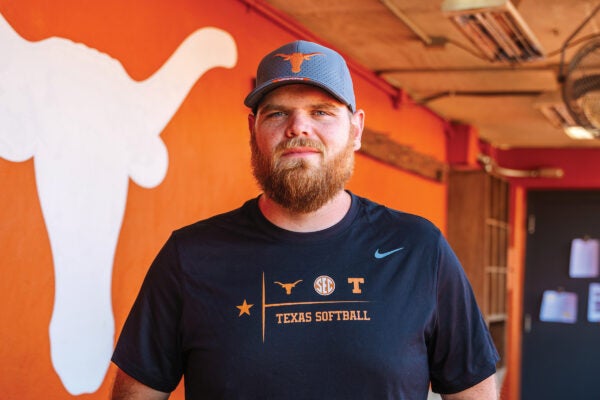Among the sea of undergraduates and faculty and staff members who bustle through UT’s campus each semester, you might encounter a graduate student employee who navigates the intersection of these most visible college identities.
Graduate student employees study for classes and dedicate hours to research. They complete assignments and take tests. They serve as teaching assistants and graders, as administrators and program coordinators, as full- or part-time employees at UT or elsewhere. Sometimes, they’re also caretakers in various capacities.
How do they balance it all? We spoke with four graduate student employees about what a typical day in their life looks like as they cycle through numerous on- and off-campus responsibilities.
Cierra Campbell Bridges
Assistant Director of Transfer Admissions
College of Education and Office of Admissions
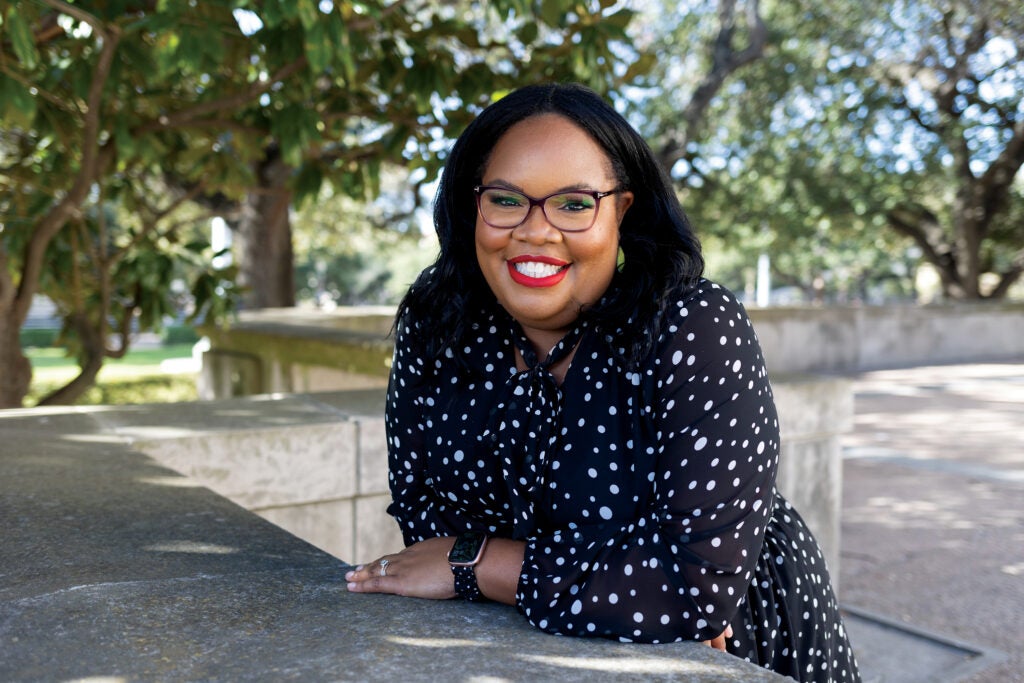
Campbell Bridges plans as if her life depends on it. That includes her day, which she says typically begins and ends with family.
Before Campbell Bridges starts her full-time job in the university’s Office of Admissions as its assistant director of transfer admissions, she fulfills her responsibilities as a wife and as a mother to a 2-year-old daughter. Then the third-year doctoral candidate tackles her daily tasks, which include counseling students and parents on the transfer process and taking the lead on the development and implementation of recruitment programs and strategies tied to traditional and Coordinated Admission Program (CAP) transfer applicants.
In the middle of the workday, Campbell Bridges attends class for her doctorate in higher education leadership and policy. She says she typically takes about two courses per semester.
A proud Black woman, Campbell Bridges devotes another portion of her time to programming and mentorship for the Fearless Leadership Institute, an organization designed to support Black and brown women at UT. Off campus, the woman of faith invests much energy into her church community, participates in her sorority, Zeta Phi Beta, and pours herself into celebrating others through parties or other events.
With so much going on in her daily schedule, it makes sense that Campbell Bridges prioritizes planning. Yet, it’s impossible to organize everything in her life.
She says she did not plan to be in school this long, for example. A Longhorn since she began her undergraduate experience on the Forty Acres in 2006, Campbell Bridges graduated with a bachelor’s degree in applied learning and development in 2010. During that time, she worked as a student employee in the Office of the Registrar. The position became full time after she graduated.
Five years after earning her master’s degree from UT in college and university student personnel administration in 2014, she began her doctoral program. Campbell Bridges is on pace to complete her studies in 2024.
“I will be Dr. Campbell Bridges one of these days,” she says. “So that means I have to write a dissertation. It’s going to be a long journey, but I’m gonna do it because I want to do it.”
Her own undergraduate experience inspired her return to school. A first-generation college student living out her “ancestors’ dream,” Campbell Bridges says she initially struggled to make friends. She changed her major and navigated a campus where most people didn’t look like her.
Once she finishes her degree, she wants to continue advocating for UT students, families, faculty and staff members to make the campus a better place for everyone, especially those most marginalized.
Reliance on God and support from her husband get her through the day, Campbell Bridges says. While she’s at work and school, her husband keeps their home in order and cares for their bubble-loving toddler. Her philosophy is to take one day at a time and set limits.
“When today is done, today is done,” she says.
Justin Carter
Suicide Prevention Programs Coordinator
LBJ School of Public Affairs and Longhorn Wellness Center
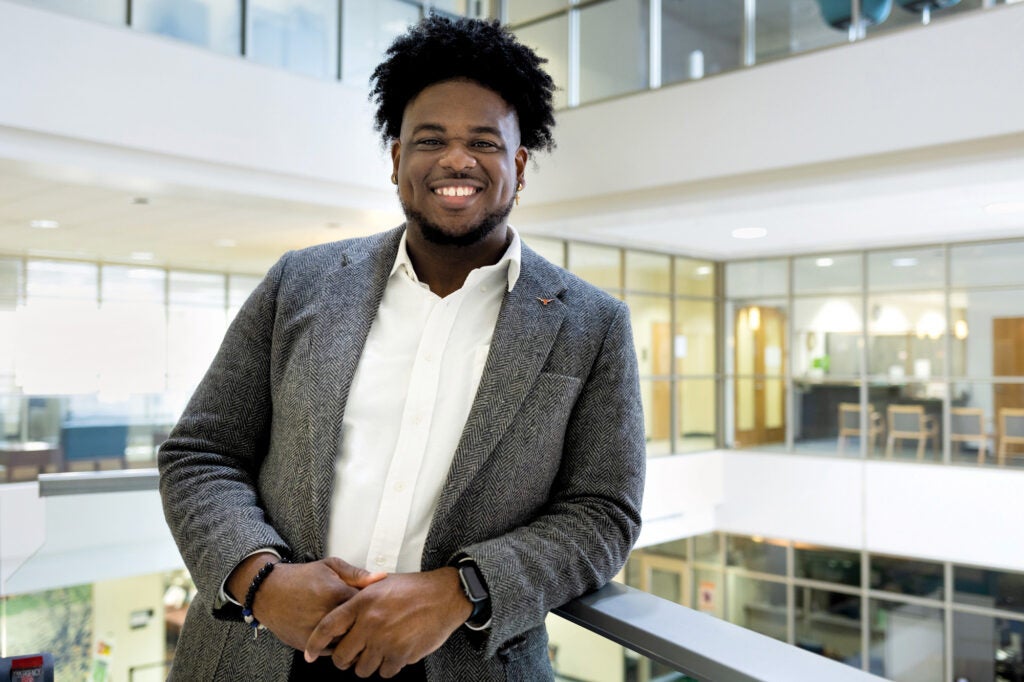
Name a TikTok dance and Justin Carter probably knows it. The 25-year-old may be a graduate student employee, but he speaks the language of the undergraduates he teaches.
Carter, the suicide prevention programs coordinator at the Longhorn Wellness Center in the Counseling and Mental Health Center, graduated from Ohio State University in 2018. He moved to Austin after securing a full-time job with Student Emergency Services and continued to pursue his passion for violence prevention and mentorship.
While he worked at UT, he still weighed other schools for a graduate education. The university’s dual master’s degree in public health and public affairs, along with its solid financial package, pushed him to choose UT over other universities in California and New York.
Here in Austin, Carter wears many hats. In addition to his suicide prevention programs coordinator role, he teaches a class called Wellness 101, an honors seminar in the College of Natural Sciences. He also financially assists his family in Ohio and takes care of a dog.
Prayer, a calendar and support help Carter navigate all his responsibilities, he says.
“If I didn’t have a supportive job like I do right now, there’s no way I’d be able to go to grad school while also teaching, while also doing my position that I’m doing,” Carter says. “Having opportunities to work for half the day and then go to class and then do homework at night. It’s definitely a lot during the week, but I get to flex my time.”
Working full time and pursuing an education simultaneously is a different world, Carter says. Stress over classes and job requirements accumulate. Organization is crucial because things get lost in the chaos of the daily routine. Taking breaks is necessary, but he says it can sometimes derail him from completing everything he needs to.
For Carter, one of the best parts about being a graduate student employee is seeing UT from a dual perspective. Before he began his graduate education, Carter helped put on the annual Gone to Texas welcome event as a staff member. When he became an official UT student, he attended the event and viewed it through a new lens. The second time around, he says, he truly felt like a Longhorn.
“I get to see the university as an administration and a business, but also I get to see it as an actual school that teaches people things,” Carter says.
Joey Schmidt
Graduate Research Assistant
College of Natural Sciences
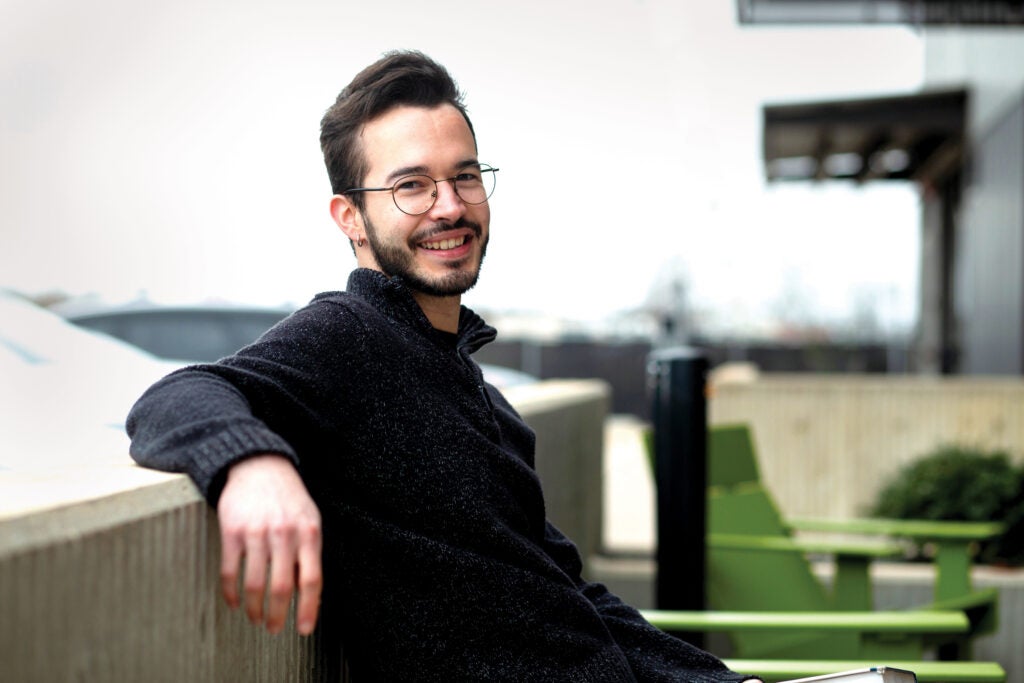
The Pomodoro Technique works wonders for Joey Schmidt.
He sets a timer for 45 minutes and pores into his computational plasma fusion doctoral studies, as lo-fi hip-hop plays in the background. Then the graduate research assistant takes a 15-minute break and enjoys calming rain sounds.
“I need music or ambient noise to keep me going,” says Schmidt, a second-year doctoral candidate.
In fall 2020, when Schmidt began his studies, he made many adjustments: South Texas to Austin and In-person classes at UT Rio Grande Valley as an undergrad to Zoom university at UT Austin. The biggest change, perhaps, was becoming a teaching assistant. He’d done tutoring work before but says he felt somewhat out of his element teaching undergrads, some of whom had attended the university longer than he had.
As he completed his coursework throughout his first few semesters, Schmidt also worked as a grader. Now, he has a sponsor and no longer needs a stipend. Along with a professor, he works under a research grant. His progress is what he makes of it, though he has one more required class before he can really make discoveries in the world of plasma fusion: Quantum Mechanics.
Schmidt wakes up at 7:30 a.m. and begins his morning ritual. Then he looks to the whiteboard in his room for guidance. Typically, the night before, Schmidt outlines four or five items he wants to complete the next day and writes them down on the board.
He works until lunchtime before heading to a coffee shop later in the afternoon to complete the day’s tasks, such as working on the editing process for a book he’s publishing. In the meantime, he plays with his cat, watches videos or reads. Not all graduate student employees are constantly working, Schmidt says, which is liberating, but not always in a good way.
Freedom from mandatory coursework, for example, makes a schedule necessary for direction, he says. He cuts himself off from doing any schoolwork at select points in the day to establish balance. “I find the freedom to do work at any time means you do work all the time,” he says. “I don’t think it’s a good, healthy way to go about it.”
Then, there’s the 100-page dissertation that won’t write itself. Time management for a project that big is key. “You’re not going to do that the night before,” Schmidt says. “So you have to learn ways to compartmentalize and split things up.”
Jinane Sounny-Slitine
Undergraduate Programs Coordinator and Adjunct Assistant Professor
Steve Hicks School of Social Work
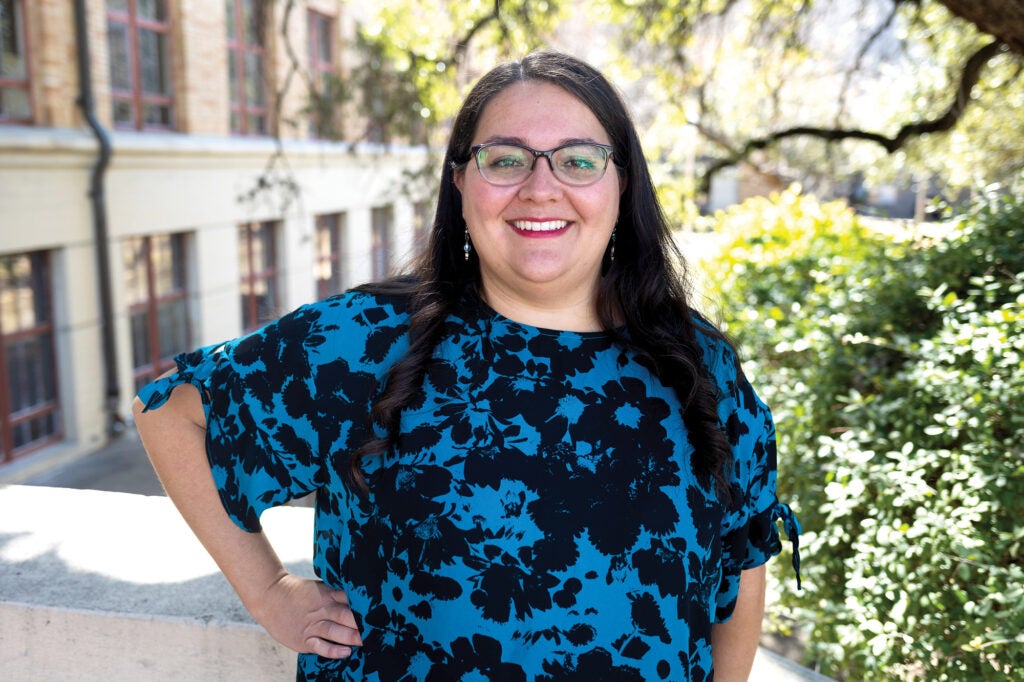
Learning never gets old for Jinane Sounny-Slitine, but love of knowledge is just one reason the third-year doctoral candidate decided to pursue a degree in higher education leadership and policy.
To make the changes she hopes to see in the education system, Sounny-Slitine says she needs the credentials. And as someone who carries several marginalized identities, the undergraduate programs coordinator and adjunct assistant professor in the Steve Hicks School of Social Work says she especially understands the inequities students face on campus.
Hailing from Austin, Sounny-Slitine attended UT for her undergraduate education and studied human development and family sciences with a focus on personal relationships. While working full time at UT, she earned her master’s degree in social work from Texas State University. Sounny-Slitine plans to complete her doctorate in 2023.
As for research, the experience of Arab students particularly interests her because she feels they are a group often underrepresented. Sounny-Slitine cares about numerous other groups on campus as well and hopes upon the completion of her degree to eventually become a dean or administrator and to continue teaching undergrads.
Her day begins early in the morning, around 5 a.m., when her brain is fresh and primed for a nice study session. Sounny-
Slitine says she stops studying at about 7:30 a.m. Then her staff role starts. She meets with students, completes administrative tasks or attends committee meetings. Some days, the UT alumna attends class.
In previous semesters, when she also taught and had to review assignments, Sounny-Slitine says she needed a breather at some point in the day. She says working from home helped her maintain much-needed flexibility in her schedule.
In addition to her other responsibilities, Sounny-Slitine serves as the primary caretaker for her two parents, which she says has its challenges. That’s why community is so paramount, especially at UT, a place Sounny-Slitine says isn’t quite designed for nontraditional students.
“Your educational journey and going through grad school is so significantly impacted by your support team,” she says. “Having that additional support that is away from school I think is really important.”
Graduate student employees are in many ways among the invisible student populations on campus, Sounny-Slitine says. The general public may not realize just how much they balance. Juggling school, full-time jobs and personal responsibilities proves difficult.
“Sometimes, that means you have to say no to things, or sometimes you might have to miss that happy hour that the cohort is going to,” Sounny-Slitine says.
She says that understanding those no’s requires only a bit of empathy, something she hopes to instill in educational policy.



